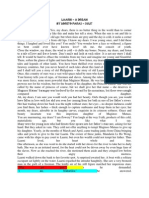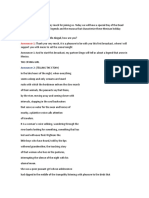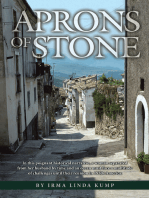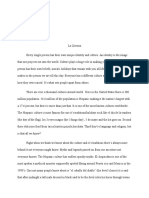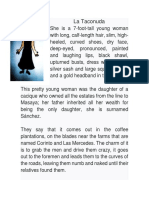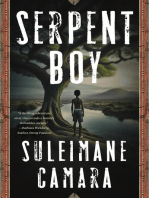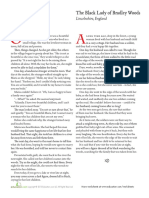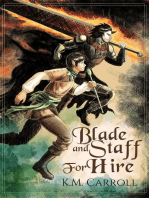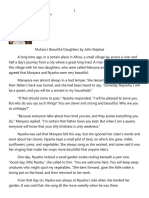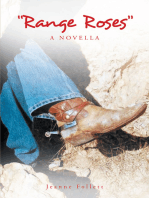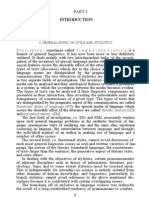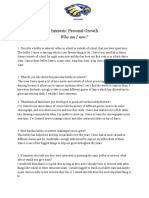Grande Is The Story of Maria Gonzales. Some Say She Was The Most Beautiful
Grande Is The Story of Maria Gonzales. Some Say She Was The Most Beautiful
Uploaded by
Picazo BcCopyright:
Available Formats
Grande Is The Story of Maria Gonzales. Some Say She Was The Most Beautiful
Grande Is The Story of Maria Gonzales. Some Say She Was The Most Beautiful
Uploaded by
Picazo BcOriginal Title
Copyright
Available Formats
Share this document
Did you find this document useful?
Is this content inappropriate?
Copyright:
Available Formats
Grande Is The Story of Maria Gonzales. Some Say She Was The Most Beautiful
Grande Is The Story of Maria Gonzales. Some Say She Was The Most Beautiful
Uploaded by
Picazo BcCopyright:
Available Formats
This is a story that the old ones have been telling to children for hundreds of years.
It is a sad tale, but it lives strong in the memories of the people, and there are many who swear that it is true. It can be traced back many miles and three centuries to become a part of the Mexican border folklore. Among the old folk tales told up and down the Rio Grande is the story of Maria Gonzales. Some say she was the most beautiful girl in the world! And because she was so beautiful, Maria thought she was better than everyone else. As Maria grew older, her pride in her beauty grew too. When she was a young woman, she would not even look at the young men from her village. They weren't good enough for her! "When I marry," Maria would say, "I will marry the most handsome man in the world." And then one day, into Maria's village rode a man who seemed to be just the one she had been talking about. He was a dashing young ranchero, the son of a wealthy rancher from the southern plains. He could ride like a Comanche! In fact, if he owned a horse, and it grew tame, he would give it away and go rope a wild horse from the plains. He thought it wasn't manly to ride a horse if it wasn't half wild. He was handsome! And he could play the guitar and sing beautifully. Maria made up her mind-that was, the man for her! She knew just the tricks to win his attention. If the ranchero spoke when they met on the pathway, she would turn her head away. When he came to her house in the evening to play his guitar and serenade her, she wouldn't even come to the window. She refused all his costly gifts. The young man fell for her tricks. "That haughty girl, Maria, Maria! " he said to himself. "I know I can win her heart. I swear I'll marry that girl." And so everything turned out as Maria planned. Before long, she and the ranchero became engaged and soon they were married. At first, things were fine. They had two children and they seemed to be a happy family together. But after a few years, the ranchero went back to the wild life of the prairies. He would leave town and be gone for months at a time. And when he returned home, it was only to visit his children. He seemed to care nothing for the beautiful Maria. He even talked of setting Maria aside and marrying a woman of his own wealthy class. As proud as Maria was, of course she became very angry with the ranchero. She also began to feel anger toward her children, because he paid attention to them, but just ignored her.
One evening, as Maria was strolling with her two children on the shady pathway near the river, the ranchero came by in a carriage. An elegant lady sat on the seat beside him. He stopped and spoke to his children, but he didn't even look at Maria. He whipped the horses on up the street. When she saw that, a terrible rage filled Maria, and it all turned against her children. And although it is sad to tell, the story says that in her anger Maria seized her two children and threw them into the river! But as they disappeared down the stream, she realized what she had done! She ran down the bank of the river, reaching out her arms to them. But they were long gone. The next morning, a traveler brought word to the villagers that a beautiful woman lay dead on the bank of the river. That is where they found Maria, and they laid her to rest where she had fallen. But the first night Maria was in the grave, the villagers heard the sound of crying down by the river. It was not the wind, it was La Llorona crying. Where are my children? And they saw a woman walking up and down the bank of the river, dressed in a long white robe, the way they had dressed Maria for burial. On many a dark night they saw her walk the river bank and cry for her children. And so they no longer spoke of her as Maria. They called her La Llorona, the weeping woman. And by that name she is known to this day. Children are warned not to go out in the dark, for, La Llorona might snatch them and never return them. La Llorona still cries for her children. She comes in the dark, on the wind, seeking that which is forever lost to her. La Llorona - from the Mexican folktale. Dont go down to the river, child, Dont go there alone; For the sobbing woman, wet and wild, Might claim you for her own. She weeps when the sun is murky red; She wails when the moon is old; She cries for her babies, still and dead, Who drowned in the water cold. Abandoned by a faithless love, Filled with fear and hate. She flung them from a cliff above
And left them to their fate. Day and night, she heard their screams, Borne on the currents crest; Their tortured faces filled her dreams, And gave her heart no rest. Crazed by guilt and dazed by pain, Weary from loss of sleep, She leaped in the river, lashed by rain, And drowned in the waters deep. She seeks her children day and night, Wandering, lost, and cold; She weeps and moans in dark and light, A tortured, restless soul. Dont go down to the river, child, Dont go there alone; For the sobbing woman, wet and wild, Might claim you for her own.
You might also like
- La Llorona Español e InglesDocument4 pagesLa Llorona Español e Inglesmirza chan80% (10)
- The Weeping WomanDocument2 pagesThe Weeping WomanVictoria GoutNo ratings yet
- Scary Stories - The Weeping WomanDocument4 pagesScary Stories - The Weeping WomantrackstarattackNo ratings yet
- La Llorona NewDocument3 pagesLa Llorona Newapi-270887022No ratings yet
- Mexican Legend ''La Llorona'' (The Weeping Woman)Document2 pagesMexican Legend ''La Llorona'' (The Weeping Woman)Ana Sofia MuñizNo ratings yet
- The Legend of The Weeping WomanDocument2 pagesThe Legend of The Weeping WomanSergi Quispe ChaiñaNo ratings yet
- LaarniDocument4 pagesLaarniBriandon CanlasNo ratings yet
- 15 Short LegendsDocument15 pages15 Short LegendsScribdTranslationsNo ratings yet
- Announcer 1Document3 pagesAnnouncer 1Ángel PiñaNo ratings yet
- Proyecto de Ingles, Segundo ParcialDocument37 pagesProyecto de Ingles, Segundo ParcialKiarita QuinchuangoNo ratings yet
- Legent The of Sampaloc Lake San PabloDocument10 pagesLegent The of Sampaloc Lake San PabloJohn DagangNo ratings yet
- La LloronaDocument1 pageLa Lloronaesparzademian800No ratings yet
- 21 STDocument11 pages21 STLyra Lang-ayan AgustoNo ratings yet
- The MoaningDocument1 pageThe MoaningAlexander VillaNo ratings yet
- MindanaoDocument5 pagesMindanaoapoc lordNo ratings yet
- The Legend of MakahiyaDocument6 pagesThe Legend of MakahiyaSychelle Chua100% (2)
- La Llorona Essay Final 1Document4 pagesLa Llorona Essay Final 1api-356022449No ratings yet
- The Weeping WomanDocument8 pagesThe Weeping WomanJason CageNo ratings yet
- La TaconudaDocument17 pagesLa TaconudaLeonel Rico Castillo100% (1)
- 20 Horror LegendsDocument24 pages20 Horror LegendsScribdTranslationsNo ratings yet
- Natalie Rhema - Final Draft La Llorona ComparisonDocument1 pageNatalie Rhema - Final Draft La Llorona Comparisonnatalie.rhemaNo ratings yet
- Love Rising Part OneDocument4 pagesLove Rising Part OneRicardo Saul LaRosaNo ratings yet
- The Legend and MythDocument33 pagesThe Legend and MythMaria Lou JundisNo ratings yet
- Compare Ghost Stories PDFDocument2 pagesCompare Ghost Stories PDFyvonne sanchezNo ratings yet
- Urban Legends: Bizarre Tales You Won't BelieveFrom EverandUrban Legends: Bizarre Tales You Won't BelieveRating: 4 out of 5 stars4/5 (1)
- THAT GIRL MONTANA (Western Classic): From the renowned author of In Love's Domain, A Flower of France, The Treasure Trail & The House of the DawnFrom EverandTHAT GIRL MONTANA (Western Classic): From the renowned author of In Love's Domain, A Flower of France, The Treasure Trail & The House of the DawnNo ratings yet
- The Indian's Hand1892 by Stoddard, LorimerDocument14 pagesThe Indian's Hand1892 by Stoddard, LorimerGutenberg.orgNo ratings yet
- Mufaros Beautiful Daughter-African Cinderella-1 1Document5 pagesMufaros Beautiful Daughter-African Cinderella-1 1api-384445150No ratings yet
- The Firebird's NestDocument9 pagesThe Firebird's NestAlina Adriana BuneaNo ratings yet
- Team6 Legend 5BVLCDocument8 pagesTeam6 Legend 5BVLCAna Sofia MuñizNo ratings yet
- The Firebird's NestDocument8 pagesThe Firebird's NestAnca Filip100% (1)
- When The Rivers Are LongDocument8 pagesWhen The Rivers Are LongPhoenix Van DykeNo ratings yet
- Blood Brothers by Willy RussellDocument4 pagesBlood Brothers by Willy Russelladamrobbins100% (1)
- Batuk Bhairav Mantra (For Removing Obstacles, Problems, Winning Court Cases and Prosperity)Document4 pagesBatuk Bhairav Mantra (For Removing Obstacles, Problems, Winning Court Cases and Prosperity)jaihanumaan191919No ratings yet
- Get Connected!: An Electrical Conductivity TesterDocument11 pagesGet Connected!: An Electrical Conductivity Testertha2chemieNo ratings yet
- Section 1 Listening Comprehension: Time-Approximately 35 Minutes (Including The Reading of The Directions For Each Part)Document7 pagesSection 1 Listening Comprehension: Time-Approximately 35 Minutes (Including The Reading of The Directions For Each Part)Arief RobiNo ratings yet
- Add Dramatic Rain To A Photo in PhotoshopDocument57 pagesAdd Dramatic Rain To A Photo in PhotoshopRoland CepedaNo ratings yet
- Tex Phonetic Chapyer 2Document3 pagesTex Phonetic Chapyer 2Desiderata JuliusNo ratings yet
- Holy Hour 11 Jul Proc15Document9 pagesHoly Hour 11 Jul Proc15MaryvincoNo ratings yet
- Transportation Engineering An IntroductionDocument23 pagesTransportation Engineering An IntroductionRed RedNo ratings yet
- Oliver Oions Banana Joe PDFDocument20 pagesOliver Oions Banana Joe PDFAnonymous EmFqTdeyc0% (1)
- Stylistics, Sometimescalled Li Nguo-Sty1istics, Isa: I. General Notes On Style and StylisticsDocument61 pagesStylistics, Sometimescalled Li Nguo-Sty1istics, Isa: I. General Notes On Style and StylisticsVladVBNo ratings yet
- Sladek CV - Feb 13 2016Document4 pagesSladek CV - Feb 13 2016Amanda SladekNo ratings yet
- VernacularDocument10 pagesVernacularHimanshu ChaudharyNo ratings yet
- Hunter Original Mens ApparelDocument18 pagesHunter Original Mens AppareldaniegabNo ratings yet
- Event Management Checklist PDFDocument3 pagesEvent Management Checklist PDFyusva88No ratings yet
- Game Concept Document Template PDFDocument1 pageGame Concept Document Template PDFVinicius SantosNo ratings yet
- Airborne All Stars Paper Flying Models of Famous A PDFDocument66 pagesAirborne All Stars Paper Flying Models of Famous A PDFSteven0% (1)
- Villa La RocheDocument16 pagesVilla La RocheYogesh ChaudhariNo ratings yet
- 27 Wise Men Are WeDocument2 pages27 Wise Men Are WeRoland Raymond RoldanNo ratings yet
- Name Signature Position Date: Designation of School Planning TeamDocument3 pagesName Signature Position Date: Designation of School Planning TeamGianne Azel Gorne Torrejos-SaludoNo ratings yet
- Disappointed, But Not Disheartened: Finding Hope in The Midst of DisappointmentDocument8 pagesDisappointed, But Not Disheartened: Finding Hope in The Midst of DisappointmentNelson MercadoNo ratings yet
- Interests Personal GrowthDocument2 pagesInterests Personal Growthapi-454337397No ratings yet
- Introduction of Copy Rights PDFDocument13 pagesIntroduction of Copy Rights PDFZainul AbedeenNo ratings yet
- DreamsDocument2 pagesDreamsapi-3707318No ratings yet
- Point of ViewDocument5 pagesPoint of ViewSweetams QuigamanNo ratings yet
- LP Mar03 WebDocument567 pagesLP Mar03 Webapi-212308969No ratings yet
- Ancient Lies in HistoryDocument34 pagesAncient Lies in Historychad ball100% (3)
- Alice - Madness Returns Main Theme Sheet Music For PianoDocument1 pageAlice - Madness Returns Main Theme Sheet Music For PianoSamanthaaaaahNo ratings yet
- Pronouns - 2012Document7 pagesPronouns - 2012Nelia TrushNo ratings yet
- A Medal Does Not Define YouDocument5 pagesA Medal Does Not Define YouJose Antonio Peralta Achaval Jr.No ratings yet
- Daily Test Name: Read The Text To Answer Questions Number 1-3!Document3 pagesDaily Test Name: Read The Text To Answer Questions Number 1-3!Andini Amaylia PutriNo ratings yet






